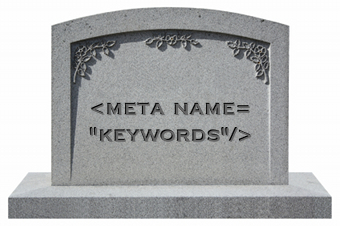 Last month, both Google and Yahoo! came out and said they (all but) completely ignore the venerable <meta name="keywords"/> tag in determining suitability of a page for a search on a given keyword.
Last month, both Google and Yahoo! came out and said they (all but) completely ignore the venerable <meta name="keywords"/> tag in determining suitability of a page for a search on a given keyword.
One of the SEO (Search Engine Optimization) best practices of Web 1.0 was to put a site's target search keywords into a META keywords tag in the HTML heading of each web page. Since the keywords in the META tag may or may not be relevant to the actual content on the page, the method was widely abused to attract searches for which the content was not really relevant.
These days, it's widely known among SEO experts that major search engines caught onto that game long ago, and efforts should focus instead on the actual content a visitor will see in their browser when visiting the web page. This, after all, is what a searcher is looking for, and is the best measure of relevance for a given keyword. As a general rule, owners of small business web sites should focus on content and who is linking to their site.
Google's recent Webmaster Central Blog post makes it quite clear: "Our web search (the well-known search at Google.com that hundreds of millions of people use each day) disregards keyword meta tags completely. They simply don't have any effect in our search ranking at present."
For SEO experts, this is hardly news. Google itself reports in the news that they've been ignoring the keywords tag for years, but search engines are famously guarded about what exactly makes up their ranking algorithms to avoid being manipulated. And the need to populate the keywords meta tag remains in hundreds of SEO books and web sites, and remains part of the tests and recommendations of automated tools that measure a site's SEO mojo.
Yahoo! was rumored to have used the tag up until this month, and still does as a last resort. Yahoo!'s position is that it will index the keywords found in the keywords meta tag, but these words receive the lowest possible ranking. So any page that actually displays one of those keywords - anywhere - will get precedence for that keyword. This is also how Microsoft's new search engine, Bing, handles the keywords tag.
In other words - for Bing and Yahoo!, there is no benefit or purpose to putting a keyword in the keywords meta tag if its already found in your site's content. And putting a keyword there that doesn't appear in your content will only put your page above other pages that don't use that keyword anywhere - in content or meta tags. Put simply, don't bother.
Enterprise search appliances (like Google's search appliance) and custom search engines often can use the keywords meta tag as a way of associating keywords not found in content (or found in files that the engine can't index). This use is typically limited to intranet content not openly accessible on the web.
The other most commonly used meta tag, the description tag, is still widely used, even by Google. Think of it as what you'd want displayed as a 1 or 2 sentence summary of the page to accompany a search result. Most search engines will use an excerpt of relevant content, but even Google says that, in certain circumstances, the content of the description meta tag is used. For example, if you search Google for "editme", the content of EditMe's description meta tag is displayed along with the result.
For more search tips, read EditMe's three part series on SEO for small business web sites.